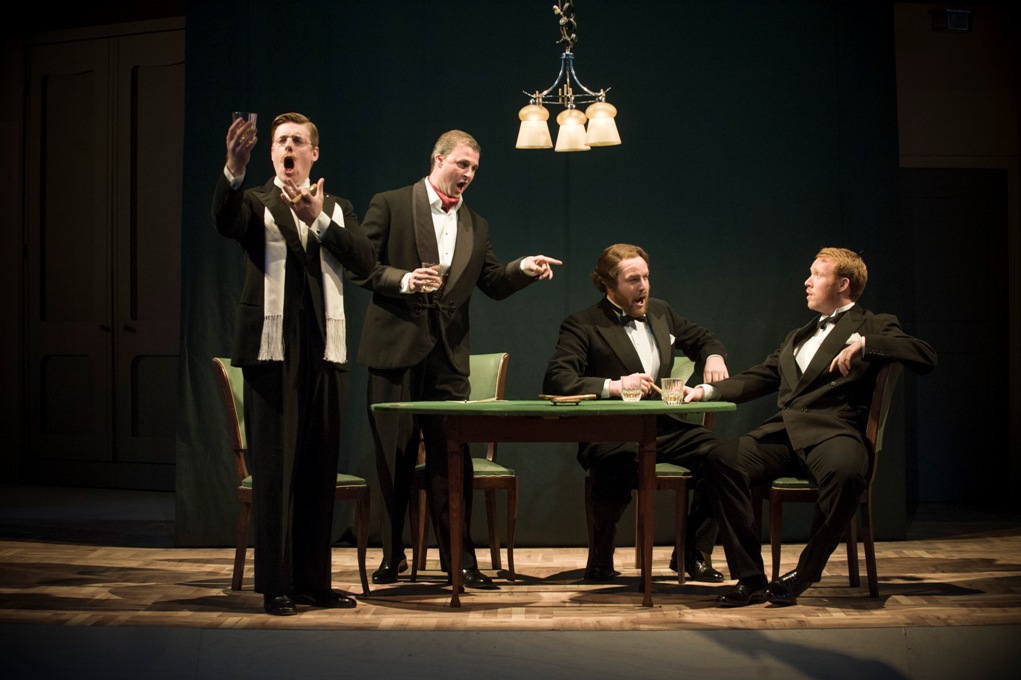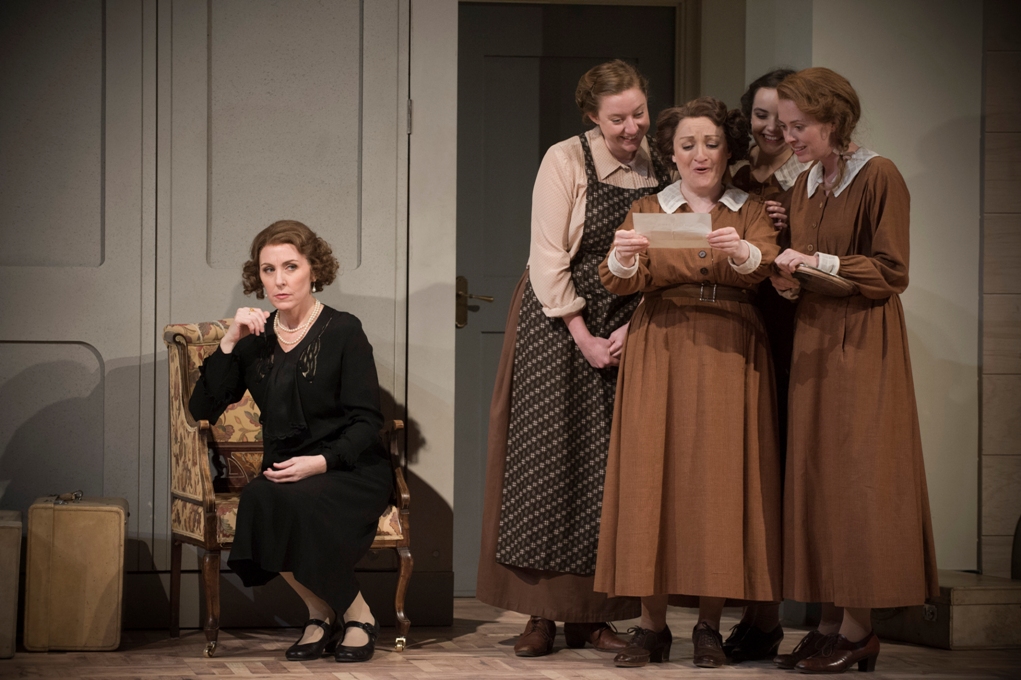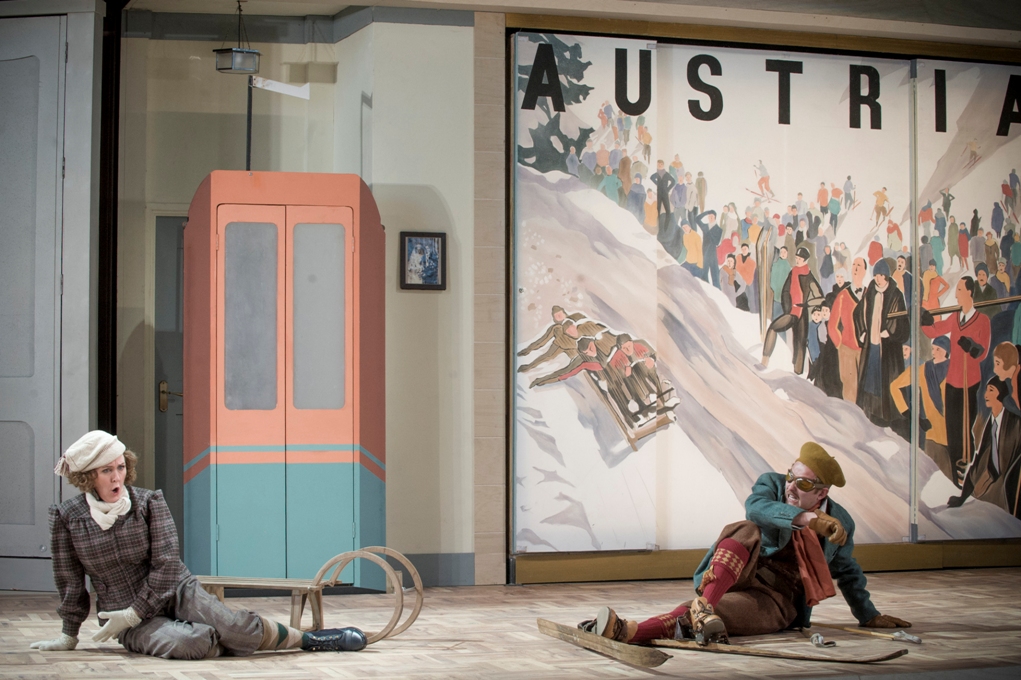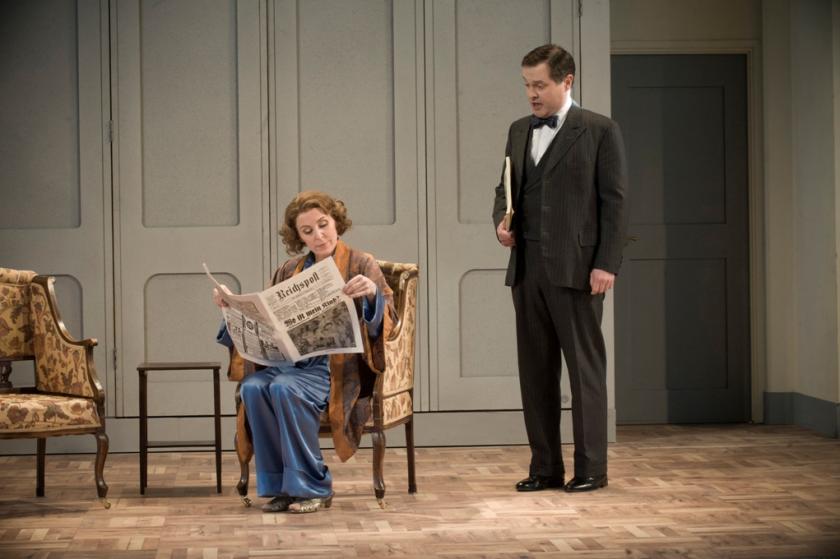In a curious deal, two operatic card games were running almost simultaneously last night. At the London Coliseum, Tchaikovsky’s outsider Hermann was gambling for his life on three hands of Faro in The Queen of Spades, while in home counties countryside, Robert Storch aka Richard Strauss thought he was relaxing from a performance with a nice game of Skat when in comes a telegram from his tricky spouse Christine, aka Pauline Strauss, unsigned as usual, accusing him of adultery.
The Skat game (pictured below) is probably the first thing opera lovers who haven’t seen or heard it know about Intermezzo, one of Strauss’s rarer if by no means neglected operas. The second is that it’s supposed to offer up a portrait of the Wife from Hell. That image was dispelled at Glyndebourne by the charm and nuance of Elisabeth Söderström and Felicity Lott, while among recent characterisations Anita Bader at Scottish Opera has carried on the good work of underlining Christine’s lovely soul. When, as at Garsington, not enough along those lines transpires, given the conjunction of a not overly charismatic heroine and an under-detailed production, all sorts of questions flood in about the work itself.
 Why, for instance, is Christine only ever seen from a male perspective? Why did Strauss himself, in crafting an anecdote from his own married life about a case of mistaken identity which nearly led to catastrophe, insert so much of what was said about Pauline, and how she clearly was both on the surface and deep down, and omit a very salient point: that she withdrew from a career as a highly-praised soprano who’d sung Isolde, no less, to raise a child and play the helpmate to one of the world’s most successful musicians? Would that not have provided some motivation for her seething discontent?
Why, for instance, is Christine only ever seen from a male perspective? Why did Strauss himself, in crafting an anecdote from his own married life about a case of mistaken identity which nearly led to catastrophe, insert so much of what was said about Pauline, and how she clearly was both on the surface and deep down, and omit a very salient point: that she withdrew from a career as a highly-praised soprano who’d sung Isolde, no less, to raise a child and play the helpmate to one of the world’s most successful musicians? Would that not have provided some motivation for her seething discontent?
Without it, this woman who spends a great percentage of a very lengthy role needling people can seem like a nightmare. Especially when the soprano-actress seems too placid to suggest the nervous volatility which drives Christine’s more unfortunate aspect. At Garsington there was danger of the same misconception which once led a distinguished critic who should have known better to describe the Marschallin in Der Rosenkavalier as a “tight-lipped bitch”.
 Admittedly Mary Dunleavy was the third singer Garsington engaged for the role. There was well-placed confidence that she knew the part inside out, having sung it for the ill-starred New York City Opera. Vocally she’s more of a light lyric soprano, a Sophie, than an opulent, multi-coloured Marschallin or Ariadne, but she can negotiate the relatively few soaring phrases – most of them towards the end of the opera – very impressively indeed. But she’s no comedienne, and since director Bruno Ravella didn’t seem to have worked on the projection and timing of the crucial spoken dialogue which should flow in and out of the quicksilver score, lines and situations which should have been both funny and real fell flat.
Admittedly Mary Dunleavy was the third singer Garsington engaged for the role. There was well-placed confidence that she knew the part inside out, having sung it for the ill-starred New York City Opera. Vocally she’s more of a light lyric soprano, a Sophie, than an opulent, multi-coloured Marschallin or Ariadne, but she can negotiate the relatively few soaring phrases – most of them towards the end of the opera – very impressively indeed. But she’s no comedienne, and since director Bruno Ravella didn’t seem to have worked on the projection and timing of the crucial spoken dialogue which should flow in and out of the quicksilver score, lines and situations which should have been both funny and real fell flat.
That it wasn’t entirely Dunleavy’s fault showed in the parallel scene where Storch, having spent three sleepless nights away in Vienna tormented by the incomprehensibility of his wife’s accusation, finds out that the mysterious telegram sent to him by a lady of doubtful reputation was meant for colleague Stroh (in real life the future New York based conductor Stransky; the actual message seems in any case to have been relatively uncompromising). Mark Stone, possessed of a full baritone voice which, in Garsington at least, is too loud too often, hardly seemed “close to madness”, as Storch claimed, just a bit of a smug bully to his unfortunate colleague - a beautifully etched vignette by promising tenor Oliver Johnston, one of four young singers who made the Act Two card game so sharp, witty and focused.
Other supporting roles are flawlessly taken. Sam Furness does a perfect comedy turn as the not very bright young fop Baron Lummer (pictured below on the ski slopes with Donleavy), a foil to Christine's more generous and vulnerable side, and Ailish Tynan with her lovable mug is pitch-perfect as the long-suffering maid Anna (pictured above reading the telegram in the group on the right; Garsington could have taken a risk and engaged her as possibly a more charismatic Christine).
 Psychologically, the production is most impressive when it catches its couple – and their son, more than usually messed up in young Louis Hynes’ impressively distraught performance – frozen in bleakness; otherwise they're mired in narcissism (the libretto is always about what the one half of the couple needs from the other, rarely about each of them as their own person). I’m not sure that Christine needs to be quite so tragic in the opera’s deepest music, the wonderful Act One interlude which is Strauss’s finest slow-movement tribute to his wife, but Dunleavy held the trauma and – in marked contrast to Intermezzo’s last outing at the old Garsington, as vulgar as this staging was lukewarm, where David Fielding had business breaking into the interlude – let the music play out to freeze-frame.
Psychologically, the production is most impressive when it catches its couple – and their son, more than usually messed up in young Louis Hynes’ impressively distraught performance – frozen in bleakness; otherwise they're mired in narcissism (the libretto is always about what the one half of the couple needs from the other, rarely about each of them as their own person). I’m not sure that Christine needs to be quite so tragic in the opera’s deepest music, the wonderful Act One interlude which is Strauss’s finest slow-movement tribute to his wife, but Dunleavy held the trauma and – in marked contrast to Intermezzo’s last outing at the old Garsington, as vulgar as this staging was lukewarm, where David Fielding had business breaking into the interlude – let the music play out to freeze-frame.
Conductor Jac von Steen could have afforded to give a bit more space to the opera's true heart, and the otherwise reliable brass were having a few bad moments here. Clearly, though, the incisive Dutchman's work on co-ordination between singers and orchestra was more miraculous than most of the audience could have realized, given the chattery nature of the realistic scenes themselves (the interludes offer the only expansion of inner feeling until the final duet).
One of the many beauties of the superlative, if (last night) chilly, Garsington Pavilion is the clarity with which the woodwind writing emerges – as essential for Strauss as it was last year for Janáček – and the lovely open stage space is in welcome proximity to the very comfortably and spaciously seated audience, a real privilege. Giles Cadle’s clean-lined set, basically the Villa Strauss subject to transformation into toboggan run, inn, Prater and various rooms elsewhere, offered the bonus of elegant scene-changes minimally affecting the marvellous orchestral interludes – no need for the usual drop-curtain.
It was just a pity that Ravella couldn’t find more precise detail to fill every scene. The “Bahn frei” whizzes down the slope didn’t happen on cue, and the waltz sequence at the Grundlsee looked badly in need of a choreographer (none credited). My guest, unfamiliar with the opera, found the final duet a “schlockfest”; good as the late, lamented Andrew Porter’s English translation may be, it uncomfortably underlines how the sentiments that a wife might like a bit of violence from a placid husband once in a while and will revert to obeying him in everything are so retrogressive for 1924. And Ravella crowned that with a final tableau where the couple, instead of heading for the bedroom, emerge on the balcony as old Richard and Pauline, looking into the sunset of the Four Last Songs’ “Im Abendrot”. It should have been heart-warming; it just seemed like the final complacency closing the lid on a very questionable relationship.















Add comment